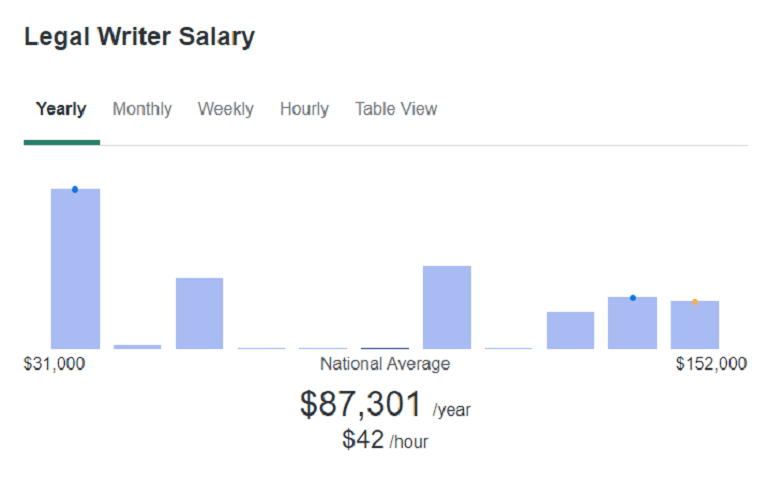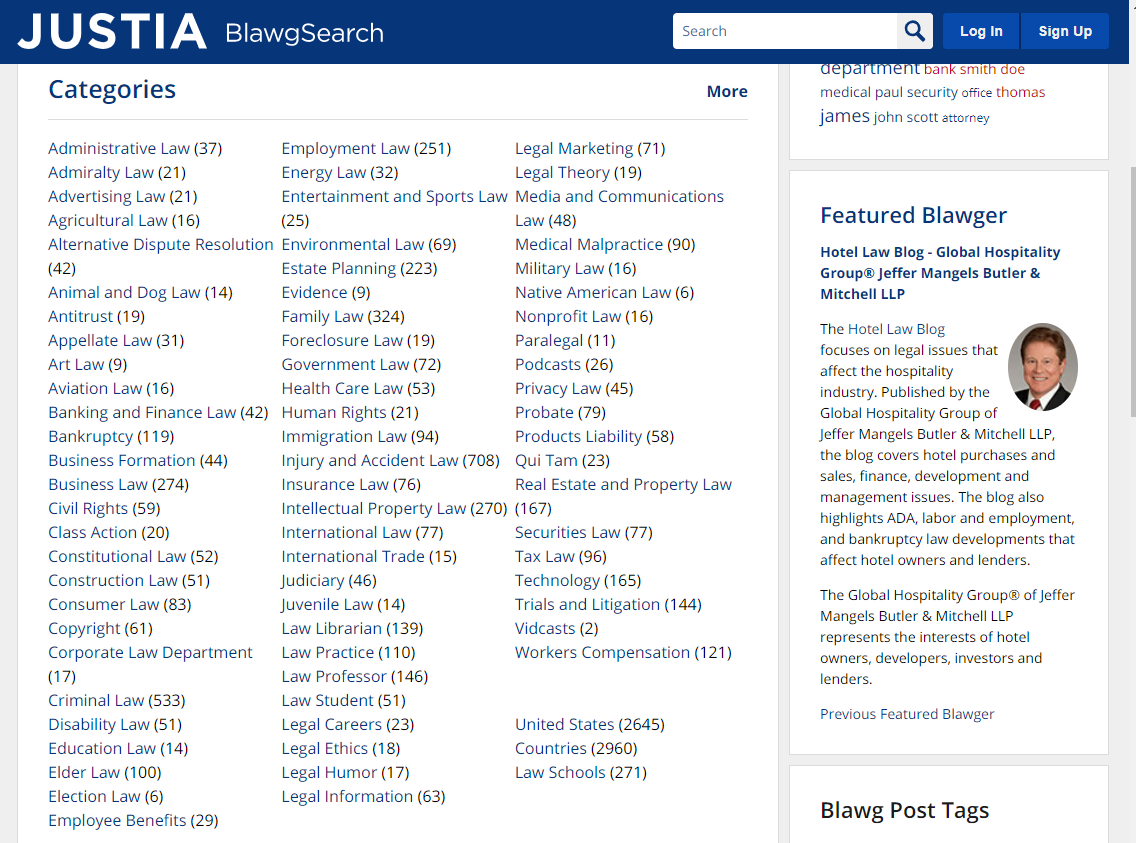Legal writing jobs are among some of the highest-paid writing jobs out there.
While many require or benefit from a law degree, not all do. And you can land a legal writing job as long as you write well and have great legal research skills.
The world has moved a large portion of its workforce out of traditional offices. This means online and freelance legal writing jobs are available. But if you’re looking for a full-time salary with benefits, law firms are hiring as well.
This post will explain legal writing, give you an idea of the pay ranges to expect, and list 9 excellent legal writing jobs to look for right now.
You’re on your way to landing your next legal writing job.

What Is a Legal Writing Job?
A legal writing job is one in which you create any form of written material for the legal industry.
Many legal writing jobs are categorized as “technical writing.” This includes writing for legal analysis, briefs, contracts, and other legal documents.
Less technical legal writing jobs involve copywriting or content creation for both online and offline materials.
What Does a Legal Writer Do?

When we hear the word “lawyer” we often conjure up images of Law & Order, The Good Wife, Perry Mason, or even Night Court. But plenty of lawyers handle legal issues without litigation.
Legal writers do research for the project at hand, then produce exceptional written content.
This includes more complicated documents, like legal briefs, or something as simple as a brochure at the front desk of a law firm (and anything in between).
Either way, it all involves legal writing.
How Much is an Average Legal Writing Salary?
There is a broad pay range for legal writing.
Part-time freelance work can be as little as $15/hr for simple editing and legal content creation.
A full-time job at a law firm can earn you over 6-figures for drafting briefs, contracts, and other legal documents. This typically requires a law degree.
As with most jobs, payment is based on the scope of work needed and the skills required. But an average legal writing salary is currently around $87,000/year.

You may be asking, what are the highest-paying writing jobs? Those will definitely require a law degree and be very technical in nature. Legal analysts and brief writers are often paid the most.
Big firms in cities like New York, San Francisco, and Chicago all have lawyers on staff whose only job is writing. No courtrooms, arguing with a judge or bringing a case before a jury required.
If you have your law degree and want to use it for writing, you could command well north of $100,000.
Are There Freelance Legal Writing Jobs?
Search “legal writer” on Fiverr and you’ll find over 800 services available. Upwork shows dozens of writers tagged as “Legal Writer” in their profiles, with nearly 1,000 total jobs completed.
There is clearly work available for a freelance legal content writer.
Legal writer profiles have pay ranges from $25/hr to $200/hr. Take some time to peruse their profiles. See what they offer and for how much, then set your own price.

But Upwork and Fiverr aren’t the only places to find freelance work.
You’ll also find that Indeed, Zip Recruiter, and LinkedIn all have freelance legal writing jobs available.
The Top 9 Legal Writing Jobs
Legal writing jobs fall under one of two banners. Technical (or “tech”) writing will require more knowledge about the legal industry. While not required in every instance, a legal “technical writer” benefit from having attended law school.
The first four jobs on our list are considered technical writing. The remaining five are non-technical, or less technical, in nature, and can be done by any freelancer with a command of the English language and strong research skills.
1. Legal Analysts

A legal analyst (sometimes called a “paralegal” or “legal assistant”) is familiar with laws and legal documents but does not have to be a licensed attorney.
They draft contracts, litigation filings, discovery material, legal memos, and other documents for a particular legal transaction or court case.
Legal analysts may also summarize case law, prepare news summaries, or analyze industry events for online legal information vendors.
2. Brief Writers
A legal brief is a document that argues why a case should be won or a motion granted. Briefs include the disputed issue, statement of facts, and supporting arguments.
As a brief writer, you will do research and create the briefs, motions, memorandums, and other legal documents for legal firms.
3. News Analysts or Legal Correspondents
A legal correspondent or news analyst will report on the latest developments in the legal industry that involve things of legal nature or criminal justice.
Correspondents typically report from a particular region or county, whereas a news analyst reports for a newspaper or broadcasting company.
4. Legal Editors

Legal editor jobs perform copyediting and content editing for a law firm or organization’s written materials. They are responsible to make sure all print and online documents meet the organization’s standards.
To be clear, this is NOT proofreading. Proofreading is more about catching typos, punctuation errors, and fixing grammar.
5. Copywriters
A copywriter in the legal industry is the same as any other industry. They write copy for web pages, brochures, advertisements, social media posts, email sequences, and more.
Law firms sell their services like any other business and need skilled copywriters to do persuasive marketing.
6. Web Writers and Bloggers
There are thousands of websites and blogs (a.k.a. “blawgs”) in the legal industry. Justia.com alone lists over 4,000 law blogs in over 70 subcategories.

These online publications, law firm websites, and law-based internet sites need legal research and SEO content.
7. Feature Writers
Magazines are a great way to get paid and get your name in front of thousands of readers. The legal industry has several trade magazines that all need feature articles.
Here are three well-known legal publications with links to contact for submission:
- The ABA Journal is an industry-standard publication by the American Bar Association.
- The Lawyer Magazine covers the activities, strategy, and management of major commercial law firms. Articles also offer advice on service and technology.
- Attorney At Law Magazine is about private practice attorneys.
8. Corporate Writers

Corporate writers create, design, write and edit a wide range of communications for the legal industry. This includes press releases, company-wide memos, newsletters, annual reports, presentations, brochures, leaflets, and other marketing copy. Some will also write academic material.
These jobs are a little more difficult to find and may take some networking to find who’s hiring.
9. Ghost Writers
Ghostwriting is when you do the writing, but don’t get any credit. Someone else puts their name on your work and is the owner. But this work tends to be more lucrative.
Many lawyers have more money than time and are willing to pay to have their amazing stories and expertise shared with the world.
How to Practice Legal Writing Like a Pro
We all want to be better writers. Practicing legal communication is similar to most other writing.
Here are few tips to keep in mind:
1. Legal Readers Make the Best Legal Writers

When it comes to legal writing, you’ll want to know what constitutes “good” in the industry.
Find well-known law blogs and read the most popular articles. Look for Supreme Court briefs and opinions. Search for legal research materials to give you an idea of how thoughts are organized.
2. Remember Who You’re Writing to and Why
Keep in mind both your audience and the purpose of your written creation.
If you write in the legal industry, there’s a good chance it’s read by lawyers and judges. But is it a blog post or a brief? Is it a story, or are you trying to persuade and advocate for your position?
3. Make Methodical Outlines
Many writers jump in and start pounding away at the keyboard. That may work for your lifestyle blog, but not in the legal writing world.
The key to successful legal writing is organization.
Whether it’s an essay, a feature article in a magazine, or a memorandum recommending a course of action, have an outline built first to guide your reader to the destination.
4. Don’t Bury the Lead
Start by telling your reader what’s important. Then, as they read, they’ll know what to look for.
Some writing tricks you can use to do this include summarizing your paragraph in the first sentence and writing powerful subheads.
These things drop clues to the reader about where to place their attention.
5. Tell a Compelling Story

Our brains naturally remember stories better than anything else. That’s why most religious texts use parables – you remember the message inside the story.
Judges and lawyers are humans too, and they appreciate a great story like anyone else.
Use narrative to make a convincing argument memorable.
6. Kill Your Legalese Darlings
Legalese is the specialized legal phrasing that lawyers use in briefs, contracts, and other documents. Examples are herewith, heretofore, hereinafter, aforementioned, and wherein.
Get rid of the legalese. It makes your writing difficult to read and understand.
Use simple language and go for clarity.
7. Use the Active Voice
When your sentence doesn’t have the subject of the verb, you are using passive voice; you’re not showing who is responsible.
Tell your reader who is doing the acting by putting that person at the front of the sentence.
Don’t write the car crashed into the store, instead write the defendant crashed the car into the store.
8. Edit Without Mercy

Proofreading is of the utmost importance in legal writing.
Correct grammar, punctuation, and spelling are a given. Cut unnecessary words and phrases, use power words, and make smooth transitions for a better reading experience.
One of the best practices any content writer can do is to write daily.
The more you write, the more your skills will grow. Better skills lead to stronger and more consistent content, which creates more writing jobs.
Are Legal Writing Jobs in Your Future?
The legal writing field is wide-ranging, full of opportunities, and looking for new writers like you. There’s never been a better time to jump into the industry.
If you have a law degree, there’s no reason to wait to pay off those student loans. High-paying technical writing jobs are waiting for your knowledge and skills.
No law degree? No problem. The legal industry needs copywriting, content marketing, and more.
Go read some blawgs, get your portfolio polished, and find a legal writing job today.



